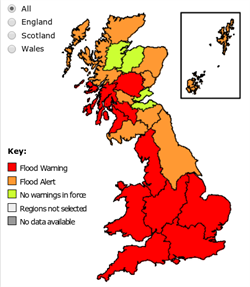Carbon Brief Staff
06.01.2014 | 12:40pmThe UK is in the midst of extremely wet weather. The Met Office has issued flood warning for almost all of the UK. But despite scientific evidence linking climate change to an increased risk of flooding, politicians and the media seem unwilling to make the connection.
Flooding is one of the biggest natural threats in the UK and climate change is predicted to raise that risk. Why? Rising temperatures mean the atmosphere can hold more moisture, which means rain falls in heavier bursts.
That doesn’t automatically mean more heavy rainfall everywhere because complex weather patterns govern the amount, timing and distribution of rainfall. But the Intergovernmental Panel on Climate Change projects a combination of factors will mean more extreme rainfall for the UK as temperatures continue to rise.
Of course, there’s more to flooding than heavy rainfall. Building houses on flood plains and paving over natural surfaces means that when it does flood, there’s more to lose.

Source: Met Office
Reduced media coverage
Given the potential damage, you might expect journalists to discuss how scientists think flooding risk alters with climate change. This isn’t always – or even often – the case, however.
Polling expert, Leo Barasi, has done a quick analysis of flooding stories in the main UK national newspapers, from 2005 to today. He found that since 2009, the number of stories in which journalists mention climate change’s link to flooding has fallen to just 11 per cent.
For instance, a surprising number of media stories on the recent downpours neglected to discuss the connection between flooding and climate change.

Source: Noise of the Crowd
While the number of stories mentioning the connection may be rebounding slightly since a 2011 low of seven per cent, Barasi says the general absence of this discussion is concerning.
He argues that one of the best ways to get the public to engage with climate change is by linking it to what the future could look like – and flooding is a stark reminder of one of climate change’s most visible impacts in the UK.
Political blindspot
But it’s not just the media that neglect to mention climate change when addressing flood risks. The politician charged with shoring up the UK’s flood defences, environment minister Owen Paterson, is reportedly unconvinced of the link – or the concept of human caused climate change altogether.
The Independent reports that the minister had not had a single briefing on climate change from his chief scientific officer during his first 14 months in office. Furthermore, he has previously said climate change could have advantages for the UK, including new opportunities for crop growth.
Paterson’s views on climate change led Labour’s shadow environment minister, Maria Eagle, to question the minister’s qualifications to protect the UK from increased flooding. Speaking to Sky News, Eagle said Paterson’s views could have “blinded him to concerns of increasing risk of flooding”.
While an ally of Paterson dismissed the comments as “nonsense and a cheap trick”, Paterson’s insouciance towards climate change is indicative of a broader trend within the Conservative party, Sunday Times columnist Adam Boulton argues.
Boulton says the Conservatives and the government “no longer seem to know where they stand on climate change”, with recent events showing just how far the government’s has moved from the prime minister’s promise to make the coalition the ‘greenest’ government ever.
Such a shift is concerning as the government designs new flooding policy.
Its current plans for a new insurance scheme have already been criticised for overlooking the impacts of climate change. And the government’s former chief scientist, Sir David King, today said government spending to address flooding may need to more than double to £1 billion per year to account for the increased flooding risk from climate change.
Notable absence
Attributing specific weather events to climate change is difficult as there has always been extreme weather. Instead, scientists talk about how climate change might be increasing the likelihood of events reaching extreme proportions.
But with a growing body of evidence pointing to a greater flood risk in the UK under climate change, discussion of the issue by politicians and within the media is notable by its absence. While acknowledging the links may not do anything to address the current severe weather battering the UK, it could help garner scientific understanding to underpin future policy choices.

